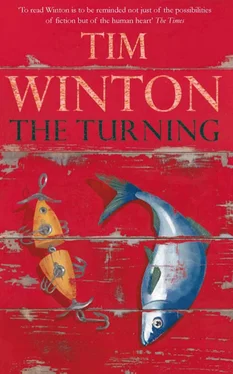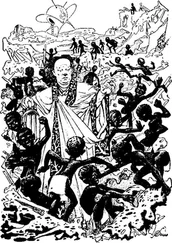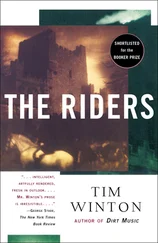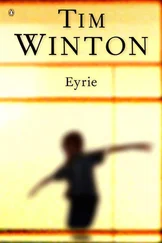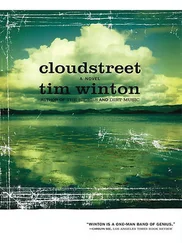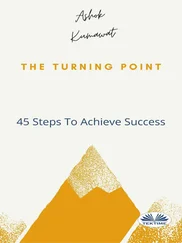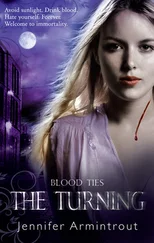Vic says he loved Alison from that first encounter. Not only could he pick her out in a crowd but he sought glimpses of her all over town. The trouble was, she was a year older and therefore perpetually out of bounds. Any dealings between year-levels were socially forbidden, and to make things worse Alison soon became surrounded by tougher, plainer girls who worked out their repulsion and fascination by forming a protective posse around her. There was just no way past them. It wasn’t as if there weren’t spunky girls his own age but they became dim presences. All the pert, hair-flicking embodiments of perfection who had only days before caused him to sweat with lust and dread simply dropped from his mind.
When she first arrived, people talked about Strawberry Alison as a shop-soiled beauty. Such a pity, they said about her birthmark. If only. Could have been a stunner. What a shame she’s damaged goods.
To Vic it was no shame at all. He wanted her, mark or no mark. He told himself he saw past it, that he was the only one who did. Though in time he came to admit to himself that he loved Alison because of the mark, not just despite it. This, when it came down to it, was the root of his obsession and he’s never completely explained it to me. I doubt he understands it himself, least of all now. In any dispute Vic will instinctively seek out a victim to defend. That’s his nature and it’s become his work as a labour lawyer, but I wonder if this impulse can account for his adolescent attraction to the flawed and imperfect. You see, Strawberry Alison was not the only damaged specimen to catch his imagination. Vic’s first love was also older — in fact, quite a lot older — a farm girl whose ring finger ended at the first joint, the result of an accident with a hay baler. The finger that her wedding ring would have to slide on to ended in a stump. At thirteen he was enchanted. By the finger as much as the girl herself. His first kiss. She let him touch her breasts. It only happened the once — the whole thing lasted less than a day, a holiday encounter — but the strange excitement lingered. The Alison business wasn’t so shortlived; it went on for years. I fear it isn’t over yet.
Perhaps you could put Vic’s fascination down to the times, Vietnam in shrieking flames on TV every night. That naked burning girl running down the road over and over again. Or maybe it’s just the ruin and wreckage you’re privy to as a copper’s kid in a country town, the horrible weight of knowledge, all those distorting secrets the rest of us are spared. I used to think he exaggerated this stuff but his mother Carol put me straight. That town, Angelus, wasn’t such a quaint place in those days. It crushed her husband. Something happened there which caused him to lose his way. He began to drink. Bob Lang, the proverbial straightshooter, became a local joke. And then their infant daughter died of meningitis. Vic was fifteen. He never mentioned a sister, never once said a word. I couldn’t believe it — I was incensed — and when I confronted him about it he told me that he’d forgotten. A sick look came over his face. I pressed him for details but he picked up his keys and backed towards the door. I let him go. Angry as I was, I believed him. He’d blocked her from his mind. He looked as appalled as I was.
For years Vic never even spoke to Strawberry Alison. Until he was sixteen the closest he ever got to her was the library window. One afternoon, while stuck in a carrel, he glanced up to see Alison peering in. She wasn’t looking in at all; she’d just caught sight of herself in the reflective glass and paused a moment in passing. She came closer, right up to the sill, and he was struck by the sadness of her gaze. She was full of longing, anybody could see that, and she was barely an arm’s length away. Vic wanted to touch her face, to tell her that she needn’t pine for a perfection he didn’t want anyway. Her breath fogged the glass. She stepped back, pulled her hair behind her ear and walked on.
Carol told me that Vic was an anxious boy. She was reluctant to blame his father but Bob saw menace at every turn. The cop thing. What Bob didn’t realize was that in addition to keeping him safe, his attempts to protect Vic from accident and injury transmitted fear. Unspoken worries hung over him like the omnipresent stink of the harbour. As a child of rigid fundamentalists I can identify with this, for although God Himself was supposed to have made it and sustained it, and though it seemed so beautiful, the world around us was eternally dangerous. The price of spiritual freedom, we learnt, was eternal vigilance. Such a high price for so long.
Less than a year after the child died, Bob Lang did a runner, quit the Force and disappeared. Vic has a compensatory element to his character. When he talks about his pro bono clients you can see the earnest teenager in him. You can picture him battling on with his mother, feeling responsible for her as the only man, the only child in her life. And then I think of Strawberry Alison and his boyhood conviction that he alone understood her trouble, that only he saw the true face behind the mask. So endearing until you think of it turned your way. It’s no fun wondering if your husband’s love could be another act of kindness, whether there’s something about you he feels you need to be compensated for, as if you too qualify as his sort of damaged goods. Trust me, these weekends aren’t all whales and bracing sea-mist. Some days I stay in and get plastered. Several times now the motel manager has come to the door to ask me to keep the racket down.
During his school years Vic maintained a kind of adoring surveillance of Alison, though he made sure he only followed her brazenly once a week. More than this, he knew, would be creepy. He hated the way other girls finished her sentences for her, how they patronized her by pretending to be envious of her long, smooth legs and ran their fingers through her glossy hair until he wanted to shove them into the lockers and shout in their faces. Yet he had to concede that some of their envy might be genuine because Alison did have fantastic legs and her hair was lustrous to the point of causing physical pain. Although he loved her face above all else, Vic grew more and more aware of her body. He was just a stick, a boy, and day by day as she grew more womanly, she became less attainable. Yet something in him refused to let go. During the day he dreamt of piling her into a car and tearing out of town. They’d go north. He’d rescue her, love her, marry her. White dress. Definitely no veil. He worked himself up into a romantic fantasy. But at night he got himself into far simpler turmoil thinking of her long legs around him and her breasts in his hands.
He found that the only legitimate way to watch Alison was on the netball court, where he could be part of a crowd, even if it struck some people as unusual. Here nobody patronized her. When she played centre she drew no pity; she was a fearsome thing, a cutthroat player with a temperament to match her face. In the exertion of the game both her cheeks and all of her neck grew red. Vic stood back a little or even watched through the chain-link fence as Alison cut them up. Whenever he stood near the half-time huddle he swore he felt the heat off her.
As a boy Vic was not the confiding sort. Nothing’s changed in that regard. He never told his mates about his thing for Alison but his obsession must have been hard to conceal. The others were onto him. They thought it was funny. Who cares about the mantelpiece, they said, when you’re busy stoking the fire? He didn’t bother to explain himself. He just watched Alison and kept his ear to the ground. It was a small enough town for news to travel quickly and Vic knew who took her to the drive-ins and who claimed to have gone all the way, but he dismissed most of it as wishful thinking. Not every girl at the drives was like the legendary Slack Jackie. The stories about Alison didn’t bear scrutiny.
Читать дальше
